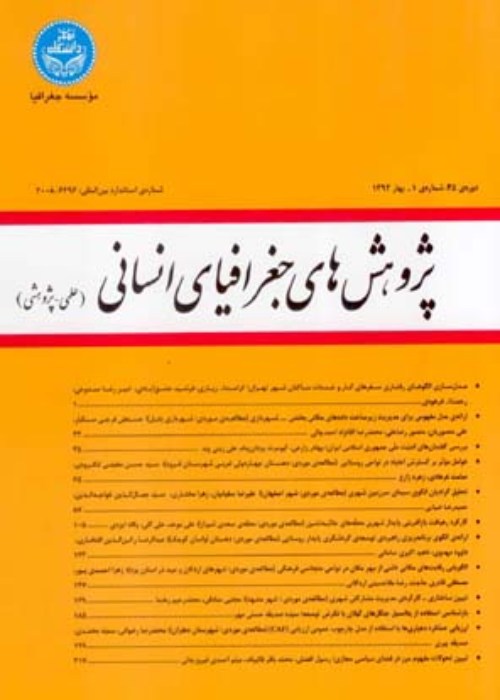Comparing the Concept of “National Sovereneigty” in the Constitions of Constitional System and Islamic Republic of Iran
Although the issue of “constitution” is usually studied in the field of public law, it is also a subject of interest to political geographers. One of the issues following which the constitution is formed is the occurrence of a revolution or coup de ’tat in one country. Iran is a country that has experienced two major and important political revolutions in less than a century: the “Constitutional Revolution” and the “Islamic Revolution”, the greatest achievement of both being the development of constitution. This article compares the concept of “national sovereignty” as one of the most important and fundamental concepts of political geography in these two laws.
This present study is an applied research. In order to compare the concept of national sovereignty in the constitutional system and Islamic republic constitutions, the “documentary method” has been used and then data has been analyzed in an analytical manner. Data has been collected through library and computer resources.
Both domestic and foreign conditions and factors have affected the development of both constitution as well as expressing the “concept of national sovereignty” in terms of “time” and “place”. For example, the “constitutional constitution” reflects the political, economic, and cultural factors of the country and the mentalities of the influential people in the Constitutional Revolution. So that the text of “the constitution and its complement” also explicitly represents the customs and traditions, beliefs and desires of the various social classes, the apparent and hidden forces and powers affecting and dominating the constitutional revolution. The spirit of the “constitutional constitution” has also been influenced by external factors, especially the constitution of countries such as France and Belgium. While the spirit of the “Constitution of the Islamic Republic”, under the influence of internal and external factors, reflects the ideological nature of the Islamic Revolution of Iran, Imam Khomeini's ideas, freedom from the domination of foreigners, joining the Muslim world and supporting the oppressed people of the world.The concept of “national sovereignty” in the constitution of the Islamic Republic, while having similarities with the constitution of the constitutional system, also has serious differences with that law. Both laws, consider “sovereignty of people” on their political destiny, in both laws the “rule of sovereignty” has been considered under the control of the three forces (albeit with differences), in both laws for the political participation of the people, special attention has been paid to “election”, and finally, in both laws, the conformity of the laws with the “Islamic rules” has been considered. But at the same time, the concept of “national sovereignty” in the constitution of the Islamic Republic of Iran has some differences with the constitution of the constitutional system. As an example, there is a major difference between the political system of the constitutional revolution and the Islamic Republic. Moreover, in the constitution of the constitutional system, “the sovereignty of the nation” was envisaged, while in the constitution of the Islamic Republic the “double sovereignty” (both the God and the nation) was considered; also in the constitution of the constitutional system, “the leadership of the state” was with the “king”. While in the constitution of the Islamic Republic, a religious leader called “the supreme leader” is at the head of government; the Islamic Republic's constitution also emphasizes the “implementation of Islamic law”. In order to adapt the contents of the laws of the Islamic Consultative Assembly to Islamic standards and the constitution, a 12-member assembly called the “Constitution Guard Council”, with the participation of six members of just and well-informed jurisprudents of the time, to elect a leader and six lawyers has been predicted by the Islamic Consultative Assembly. The Guardian Council has also interpreted the constitution and confirmed the credentials of presidential candidates and Islamic Consultative Assembly members. Finally, it seems that both constitutions, despite having been drafted in different time and space, have drawn attention to the “concept of national sovereignty” jointly. Although the constitution of the Islamic Republic, contrary to the Constitution of the constitutional system, has emphasized the “relative sovereignty of the nation”, it has witnessed a greater emphasis on the role of the people in the national state through emphasis on elections in different affairs and referring to people's direct opinions.
The comparison of “the concept of national sovereignty” in the two constitutions shows that “the constitution of constitutional system, considers “sovereignty” as belonging to only that nation, while the Islamic Republic's constitution considers absolute sovereignty as belonging to God but at the same time believes in the “sovereignty of man”. The concept of sovereignty in the constitution of constitutional system refers to the sovereignty of the people on their political and social destiny and their country, but in the “Constitution of the Islamic Republic’, the notion of “sovereignty of the people” refers to their sovereignty over political and social fate and their country, the right to legislate, the independence and territorial integrity of the country. The method of “exercising national sovereignty” in the “Constitution” of constitutional system is mainly through the election of Parliament representatives, while in the “Constitution of the Islamic Republic”, people exercise sovereignty by defining the type of political system, drafting, approving and reviewing the constitution, deciding on important economic and political issues through referendum, election of the leader, the election of the president, the election of parliamentarians, the election of city and village Islamic councils, and the oversight of government officials. In other words, the mainstream way in order to exercise national sovereignty in the “Constitution of the Islamic Republic” is “election”. Therefore, it can be said that the “Islamic Republic of Iran Constitution” provides a more comprehensive concept of “national sovereignty”
- حق عضویت دریافتی صرف حمایت از نشریات عضو و نگهداری، تکمیل و توسعه مگیران میشود.
- پرداخت حق اشتراک و دانلود مقالات اجازه بازنشر آن در سایر رسانههای چاپی و دیجیتال را به کاربر نمیدهد.



